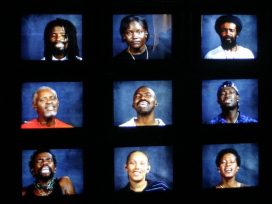
On the border between Poland and Belarus, the Forest has become the subject of a humanitarian crisis. An artist’s report, based on meetings with activists and refugees, charts this contested space. Poetry honours those lost in transit.
Questioning whether Slovene theatre is at all visible in the European landscape five years after joining the EU (pointed out in the previous editorial of Dialogi) may have been reproached for being too pessimistic. However, when one takes a look at the comparative study “Festival jungle, policy desert? – Festival policies of public authorities in Europe”, carried out in 2007 by the Polish theatre institute in Warsaw, one does not find any data about Slovenia among the discussed countries (that include both Croatia and Slovakia). The reason for this seems to be that the festival forms that exist in Slovenia today do not represent the type of eminent international festivals guided by public interest (also in the political sense of the term).
The festivals that have emerged over the past decades have done so through the hard work of enlightened individuals, not as a consequence of a stimulus by the system. Two festivals mirror this concept: Mladi levi (Young lions) introduces new production concepts (i.e. enabling residences to guest artists) but can financially barely reach beyond the identity of “the young” – and the Ex ponto festival which arose out of the need to keep ex-Yugoslav creative co-operative projects alive, and which have later grown into co-productions. In this part of Europe a truly large international festival has never actually taken root. However, in some broader context one could question what Festival Ljubljana has done for the theatre domain, or stress the high significance of Cankarjev dom as a sporadic venue of important guest performances from abroad.
The situation shows that here, international festivals of contemporary performing arts have been initiated and run solely by the NGOs (commonly called an “independent” scene) that operate outside the big cultural institutions – a scene which (as a paradox) is dependent on state or municipal cultural policy and its support and needs to engage in several other activities in order to survive. There are also successful examples, but it is not surprising that good local and international networking that results also in festivals has been achieved by a festival of street theatre (Ana Desetnica) or puppetry theatres round the country, or most recently some smaller contemporary dance initiatives (e.g. NagiB in Maribor or Ukrep at Ljubljana Dance Theatre, Front@ in Murska Sobota, Rdeci revirji in Hrastnik).
In all of this, a certain amount of effort and regionally scattered ambition can be recognized in a typically small format as well. Why was Slovenia never able to create Bitef (Belgrade) or Eurokaz (Zagreb)? Let’s leave questions that tackle history, cultural policy as well as mentality open at this point. This environment has always ensured the inseparable material/financial dividing line between institutional and non-institutional structures and made them non-cooperative, and even the rhythm of reacting to the issues of festivals in the Slovene cultural context is comparably inert.
At present, the best sample of this situation is the contemporary performing arts festival Exodos, which after its fresh impetus in the middle of the 1990s has experienced a lack of interest from the participants (who at that time were building their NGOs), as well as by politicians – neither recognized the festival’s potential or as an entity in its own right. So Exodos, between 2004-2006, solved its financial and managerial deficits by connecting itself to Cankarjev dom (the one with infrastructure: halls, offices, bookkeeping). Until recently, Exodos has prepared two festivals of national significance, though it is still operated as an enterprise with one regular employee, in constant search for people who are “available”. But as venues which could be used by professionals from a certain field don’t exist here, only one impression has been re-confirmed: that team spirit does not prosper at “the scene” or in the field of cultural policy.
A situation of this kind is not comparable to the situation of countries with a lively awareness that behind every international launch of a national theatre, and behind every festival, there is a supportive political decision and intent together with a number of professionals who come together and get support when successful! (One example would be the Canadian Transameriques festival which was established with a mission to turn Montreal into a centre of vibrant creativity.) All the rest are solo efforts by individuals. In many places, the perplexities of the art promoters arise from the transition to a market economy, which is making conditions for festival organizing even more difficult. But the current status of international festivals in Slovenia appears to be the absence of true motivation for preparing festivals which can produce and promote (one’s own and foreign) young, alternative and contemporary performing art.
And the younger generation? Due to increasingly crucial tactics of socializing rituals, the terms for a festival in the ear of many has started to lose its sense: “the making of festivals” – let’s call it “festivalism” – in this way allegedly misses the creative energy as the goal that the festival should have. Experimental approaches to theatre are still present in Slovenia, even though they remain without any stimulating ties with festivals (an exception to the rule is the festival PreGlej na glas!). Another gap is the unidentified target public that would also be the cause for the existence of festivals (this is the central focus of Transameriques or of Homo alibi in Riga). The names of the upcoming generations in Slovenia that are supposed to reach over and far beyond ourselves seem to be working underground in the sense that their system of values seems centered on survival or is anti-utopist to the extent that searching for new theatre tendencies inside of the European context is not their central concern. The need to widen the aesthetical spectrum is getting less open and far narrower.
And thus we are an island.
Published 2 October 2009
Original in Slovenian
First published by Dialogi 5-6/2009
Contributed by Dialogi © Primoz Jesenko / Dialogi / Eurozine
PDF/PRINTSubscribe to know what’s worth thinking about.

On the border between Poland and Belarus, the Forest has become the subject of a humanitarian crisis. An artist’s report, based on meetings with activists and refugees, charts this contested space. Poetry honours those lost in transit.

The white saviour, driven by a moral mission, benefits from the oppression they claim to resist. Reactions to the plight of ‘victims’ often fail to translate into concrete actions, leaving those in need of care begging for sympathy. Could acknowledgement of individual complexity to the point of mystery alter this dynamic?